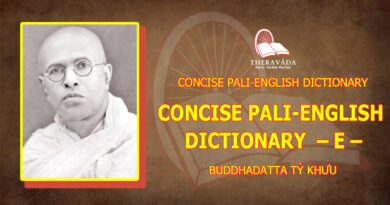Pāli Primer – Lesson 15
Lesson 15
1. The Optative or the Potential Mood
The optative expresses mainly probability and advice, and ideas such as those conveyed by if, might, would, etc.
It is formed by adding -eyya to the verbal base before terminations.
Base: paca = to cook
Singular
| 3rd | (So) paceyya = | If he would cook |
| 2nd | (Tvaṃ) paceyyāsi = | If you would cook |
| 1st | (Ahaṃ) paceyyāmi = | If I would cook |
Plural
| 3rd | (Te) paceyyuṃ = | If they would cook |
| 2nd | (Tumhe) paceyyātha = | If you would cook |
| 1st | (Mayaṃ) paceyyāma = | If we would cook |
It should be observed that the terminations of the second and first persons are similar to those of the present tense.
2. The following particles are useful for construction of sentences.
sace / yadi = if
ca = and
pi = too, also
na = not
viya = like, similar
3. Examples in sentence formation
Singular:
1. Sace so bhattaṃ paceyya, ahaṃ bhuñjeyyāmi.
If he would cook rice I will eat.
2. Sace tvaṃ iccheyyāsi, ahaṃ coraṃ puccheyyāmi.
If you would like, I will question the thief.
3. Yadi ahaṃ nagare vihareyyāmi, so pi nagaraṃ āgaccheyya.
If I dwell in the city, he too would come to the city.
Plural:
1. Sace te bhattaṃ paceyyuṃ, mayaṃ bhuñjeyyāma.
If they cook rice we will eat.
2. Sace tumhe iccheyyātha, mayaṃ core puccheyyāma.
If you so wish, we will question the thieves.
3. Yadi mayaṃ nagare vihareyyāma, te pi nagaraṃ āgaccheyyuṃ.
If we dwell in the city, they too will come to the city.
Exercise 15
4. Translate into English:
1. Sace tvaṃ dhammaṃ suṇeyyāsi, addhā (certainly) tvaṃ Buddhassa sāvako bhaveyyāsi.
2. Yadi te gītāni gāyituṃ uggaṇheyyuṃ, ahaṃ pi uggaṇheyyāmi.
3. Sace tvaṃ bījāni pahiṇeyyāsi, kassako tāni (them) khette vapeyya.
4. Sace tumhe padumāni ocineyyātha, kumārā tāni Buddhassa pūjeyyuṃ.
5. Sace tvaṃ mūlaṃ gaṇheyyāsi, ahaṃ dussaṃ ādadeyyāmi.
6. Yadi mayaṃ bhūpālena saha manteyyāma amaccā na āgaccheyyuṃ.
7. Sace tumhe rukkhe ropeyyātha dārakā phalāni bhuñjeyyuṃ.
8. Sace mayaṃ sappurisā bhaveyyāma, puttā pi sappurisā bhaveyyuṃ.
9. Sace bhūpālā dhammena dīpe pāleyyuṃ, mayaṃ bhūpālesu pasīdeyyāma.
10. Sace kassako goṇaṃ vikkiṇeyya, vāṇijo taṃ kiṇeyya.
11. Sace manusse pīḷentā asappurisā gāmaṃ āgaccheyyuṃ ahaṃ te ovadeyyāmi.
12. Yadi amaccā pāpaṃ parivajeyyuṃ, manussā pāpaṃ na kareyyuṃ.
13. Sace tumhe pabbataṃ āruheyyātha, āhiṇḍante mige ca rukkhesu carante makkaṭe ca uḍḍente sakuṇe ca passeyyātha.
14. Sace tvaṃ pattena pānīyaṃ āneyyāsi pipāsito (thirsty) so piveyya.
15. Kusalakammāni katvā tumhe manussaloke uppajituṃ ussaheyyātha.
16. Sace so vejjo bhaveyya, ahaṃ taṃ (him) rodantaṃ dārakaṃ passituṃ āneyyāmi.
17. Yadi putto pāpaṃ kareyya ahaṃ taṃ (him) ovadeyyāmi.
18. Sace amacco paṇḍitaṃ ācariyaṃ āneyya mayaṃ dhammaṃ uggaṇheyyāma.
19. Sace ahaṃ hatthena suvaṃ phusituṃ ussaheyyāmi so gehā uppateyya.
20. Yadi so vejjaṃ pakkosituṃ iccheyya ahaṃ taṃ (him) āneyyāmi.
5. Translate into Pāli:
1. If you cover the evil deeds your sons do, they will become thieves.
2. If you (pl.) want to become virtuous men avoid evil.
3. If we look with our eyes we will see objects in the world, if we look with our minds we will see good and evil.
4. If you (sg.) start singing a song, the children will start dancing.
5. If we depart from the human world we will not fear to be born in the human world.
6. If gods are born in the human world they will do meritorious deeds.
7. If you search for the truth you will approach the Buddha living in the monastery.
8. If you admonish the merchant he will become a virtuous man.
9. If I invite the monk he will come home to preach the dhamma.
10. If you are a good man you will not kill oxen roaming in the forest.
11. If you do work in the field you will get wealth and corn.
12. If the king wishes to govern the island righteously he will discuss with wise men and ministers.
13. If you work in the field you will see farmers ploughing.
14. I see boys playing in the park with a monkey.
15. If they want to see birds singing they will go to the park.
16. If you listen to the dhamma you will be able to live righteously.
17. If you avoid evil friends (pāpamitte) you will become a good man.
18. If the minister is not a good man we will not approach him.
19. If there are fruits on the tree I will climb to pick them (tāni).
20. If I pick fruits you will eat them with friends.
-ooOoo-









